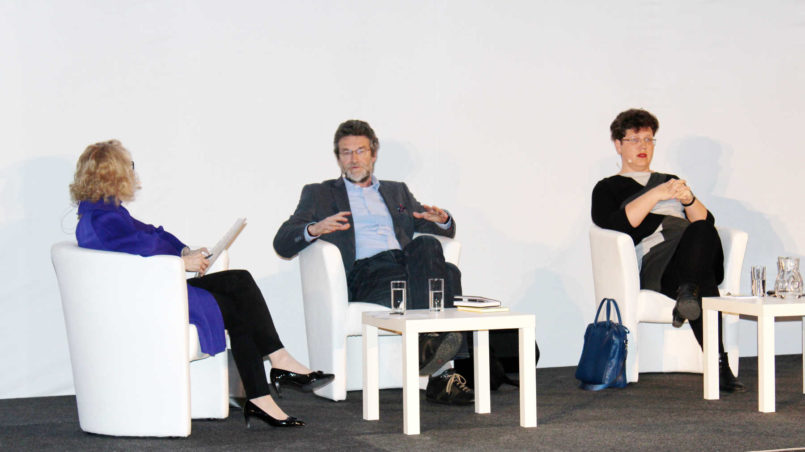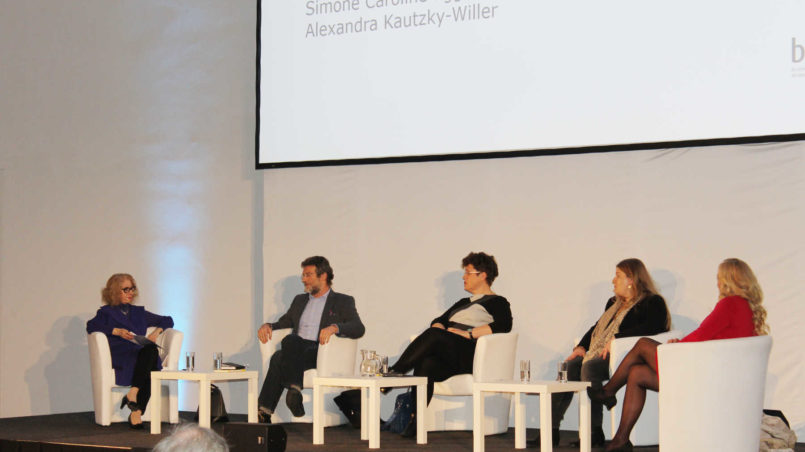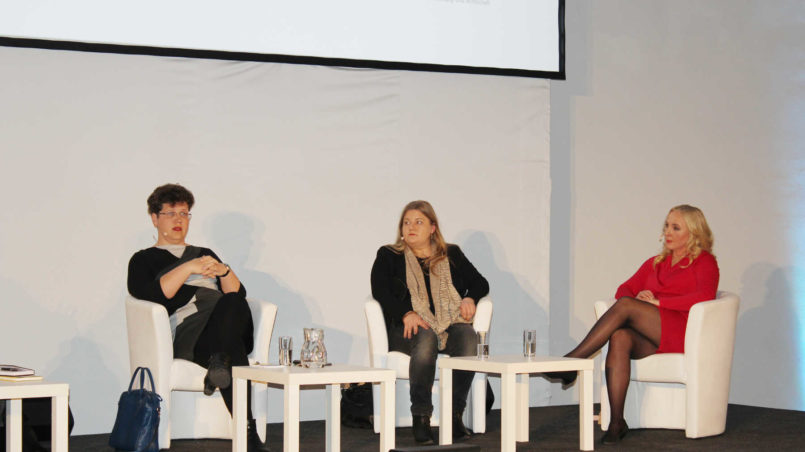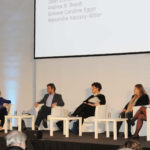Science Talk: Identity and its Significance

Event data
- Datum
- 20. 3. 2017
- Host
- Bundesministerium für Wissenschaft, Forschung und Wirtschaft
- Location
- Aula der Wissenschaften
- Event-type
- Science Talk - Podiumsdiskussion
- Participants
- Elisabeth J. Nöstlinger-Jochum, Moderation
- Univ.-Prof. Dr. Dr. h.c. Josef Christian Aigner, Institut für Psychosoziale Intervention und Kommunikations- forschung, Universität Innsbruck
- Mag. Dr. Andrea B. Braidt, MLitt, Vizerektorin für Kunst und Forschung der Akademie der bildenden Künste Wien
- Postdoc-Ass. Dr. Simone Caroline Egger, M.A., Institut für Kulturanalyse, Universität Klagenfurt
- Univ.-Prof. Dr. Alexandra Kautzky-Willer, Gendermedizinerin, Medizinische Universität Wien, Wissenschaftlerin des Jahres 2017
Once again the event series, “Science Talk”, took place in the Aula der Wissenschaften on March 20, 2017. This time, the topic was: “Everyone is everything?! How identities emerge and what significance they have.”
Univ.-Prof. Dr. Dr. h.c. Josef Christian Aigner (Institute für Psychosocial Intervention and Communication Research, University of Innsbruck), Mag. Dr. Andrea B. Braidt, MLitt (Vice-Rector for Art and Research at the Academy of Fine Art, Vienna), Postdoc-Ass. Dr. Simone Caroline Egger, M.A. (Institute for Cultural Analysis, University of Klagenfurt) as well as Univ.-Prof. Dr. Alexandra Kautzky-Willer (Head of the Gender Medicine Unit, Medical University of Vienna, Scientist of the Year 2017) had been invited to take part in the discussion.
The panel discussion was moderated by Elisabeth J. Nöstlinger-Jochum (Ö1), who opened the discussion by asking Prof. Aigner how identities are to be understood.
Introduction and Definition
In the context of this topic, he was reminded of his dissertation, which he wrote on identity formation 37 years ago. He found it nice to return to his initial topic at a time when he is approaching the end of his university career. At that time, he examined the alienating mechanisms of society and the working environment. According to Prof. Aigner, it is important to bring the term into this discussion; after all there still are alienating factors for our identities, be it the gender identity or the generation identity.

Prof. Kautzky-Willer, as a specialist in gender, comments on the gender identity from the standpoint of gender medicine. As known, this science is based on the biopsychosocial concept. She personally would describe identity as the unique whole of a person, which is put comprised of partial identities which are shaped by self-perception.
Fr. Postdoc-Ass. Egger, due to her scientific background, stated that identity is to be considered from a cultural studies perspective. According to Egger, the already mentioned aspects are of interest in a broader context for her. Originating from the biography, many aspects are presumed to condition us. It is a characteristic of the post-modern age that we are partly confused, intimidated, sometimes alienated from each other due to the multitude of possibilities which can, however, also open doors to new opportunities for us. In addition to the innate sexual features she stressed the significance of the inherent environment and the family in particular.
Gender identity
Nöstlinger-Jochum wanted to know from Mag. Dr. Braidt if artists have a special identity. In art, according to Mag. Dr. Braidt, the crisis-proneness of the identity has been an issue for a long time. Referring to the already mentioned ideas, she mentioned the performativity of gender identity in particular. This was outlines in the early 90s by Judith Butler and also assumes that identity is a process and always has to be produced anew.
The ultrasound image does not define “whether male or female”. In affirmative processes, the masculinity and the femininity have to be produced post-natally again and again. Not only does the entire environment of the child (parents, kindergartens, etc) take part in this, but also the person himself/herself (with choice of dress, etc.) Furthermore this concerns what type of femininity or masculinity we would rebuild time and again. It is important to state that these processes only partly occur consciously.
She believes that artists use their identity performances deliberately and intentionally.
Prof. Kautzky-Willer explained the medical significance of a gender which is not unequivocally defined. She is already happy if gender is taken into account in medicine and gender sensitive treatment is provided. With most people the hormonal, genetic and emotional gender corresponds with the external and internal gender characteristics. But small variations concerning this exist, as well as intersexuality. As already mentioned, she is glad if note is taken of gender as regards the effects of medication in treatment. For various illnesses there are significant differences. This knowledge is very important for transgender and gender dsyphoria.
Dr. Braidt pointed out that the psychological strain can not only arise from internal, but also from societal expectations. Society often assumes ideal-typical conceptions of the norm of identities. If someone does not comply with the standard, they will, sooner or later, suffer in various ways. Especially in the case of gender identity, this is enormously important – you realise this with your own insecurity when you see a person whose gender is not completely clear.
Currently the various binary gendered things are being viewed in the course of the “Non-Binary Universities Project” – the best example being, of course, toilets, where one has to choose the one or the other door. But some people do not want to decide – here strong normative rules exist.

Is transgender a passing fad?
In this context, Prof. Kautzky-Willer disagreed with Mag. Dr. Braidt – tolerance is “in”, there exists a danger that this will be used playfully. There is an enormous increase in the number of teenagers who visit the transgender outpatient clinic. But nine from ten visitors primarily only want to interrupt puberty with gender reassignment medication and do not mainly strive for gender reassignment surgery.
Prof. Aigner agreed with Prof. Kautzky-Willer from a psychotherapeutic perspective. True transgender people feel that something is “not quite right” already from an early age. This early pressure causes a high level of suffering. In both medicine and psychotherapy, there is, to date, no physicality (i.e. body therapy does not exist). He also does not share the view that identity always has to be newly created. It has rather to be newly re-balanced (as Erik Erikson postulated).
He does not agree with the arbitrariness of everything being newly producible/changeable – it is rather connected to alienation.
Mag. Dr. Braidt strongly disagreed with Prof. Aigner in this context.
Prof. Kautzky-Willer took up this issue and reported that when the penis was injured in the course of a phimosis operation, an artificial vagina was often formed and the child was then brought up as a female. Subsequently, the child received all the environmental influences of a female upbringing as if she had always been female. There is the famous example of the twin brothers, one of whom was brought up as a girl. However, she was unhappy all her life (without knowing this background) and ultimately committed suicide. This confirms that gender is obviously not only constructed.
Identity of the homeland
Postdoc-Ass. Egger also regards the homeland as flexible and this also has to imagined as a process. Beyond the topic of transgender, the binary man-woman system has also gained momentum. This contains considerations as to how men behave, what masculinity/femininity mean today. Nowadays women have other employment biographies, have to be more mobile. This raises the question of where one feels one belongs, what homeland means. This could also be friends and the smart phone, which enables a network to the homeland to be maintained, can be considered an important tool.
Flight is also a central topic – there are around 60 million people searching for a homeland who expereince an extreme identity crisis. Refugees have to negotiate with themselves as to how to be in the new society, what values are important, etc.
Hr. Prof. Aigner refuted this with the “core self” from the self-psychological theory of Heinz Kohut from Vienna. He postulated that every person is born with a core self, a potential to develop. This already contains all the possibilities of this individual. Binarity is in the meantime “liquified” according to Aigner.

The significance of education
According to Prof. Kautzky-Willer there are, despite the changeabilty, there is a certain genetic basis. Lifestyle can have a great influence and can offset certain advantages or disadvantages of gentics. The epigentic influences also play a role here – sexual hormones have an influence on other hormones but too little is known in this context. Biology certainly plays a great role, there is an “equipment basis”. Emotional and social resources provided by the envoronment, however, contribute greatly. It is important whether a person is trained, encouraged. According to Kautzky-Willer, the gender differences in performance can often be the result of different promotion of skills.
According to Postdoc-Ass. Egger, education has a central value in the formation of identity. The question of to which milieu one belongs, what education one has, obviously have a great influence. Education is a fundamental key, for example, of whether one has access to appropriate schooling.
Prof. Aigner asked whether this means that if the education is higher, identity increases? Postdoc-Ass. Egger replied that the question is whether there is an offer – of course the creativity of a young refugee in Lebanon could be encouraged by schooling. Possibly this child is also supported strongly by his parents in the formation of his identity. On the other hand, an Austrian primary school child, who receives little support from his parents and is confused by teachers could already experience an identity crisis at the age of nine. Naturally diverse factors interact but the possibility to be supported and encouraged in that which one does best is of importance.
Authenticity
Fr. Nöstlinger-Jochum then directed the topic to the existenzialists for whom in the context of identity, authenticity is also very important. In reply to the question of how authenticity is dealt with within gender studies, Mag. Dr. Braidt stated that in particular the adoption and appropriation of the expletive “queer” by the lesbian and homosexual movement has made the expletive powerless. As a result the word has stopped being insulting and authenticated.
Prof. Aigner considers authenticity to be “the measure of freedom in which one can live identity”. This means not having to adjust in order to receive recognition.
According to Mag. Dr. Braidt some feminist theories have exposed authenticity as a privilege of masculinity. Femininity involves maintaining a female masquerade to which women are partially condemned. Prof. Aigner refuted this statement as biased ideology; in psychoanalysis he has seen many deflections in men, much to the detriment of their health.
Fr. Mag. Dr. Braidt stated that authenticity has much to do with being relaxed. It is about simply being without having to think too much. Here Postdoc-Ass. Egger added: the feeling of being understood, of being relaxed is also an indicator for homeland.
After these appropriate conclusions the audience were invited to ask questions.
Translation German-English: Donna Stockenhuber
Credits
| Image | Title | Author | License |
|---|---|---|---|
 |
Science Talk Identity | Johanna Bickel | CC BY-SA 4.0 |
 |
Das Plenum des Science Talks | Johanna Bickel | CC BY-SA 4.0 |
 |
Science Talk Identity | Johanna Bickel | CC BY-SA 4.0 |
